Index relies entirely on the support of donors and readers to do its work.
Help us keep amplifying censored voices today.
[vc_row][vc_column][vc_custom_heading text=”With contributions from Kerry Hudson, Chen Xiwo, Elif Shafak, Meera Selva, Steven Borowiec, Brian Patten and Dean Atta”][/vc_column][/vc_row][vc_row][vc_column][vc_column_text]
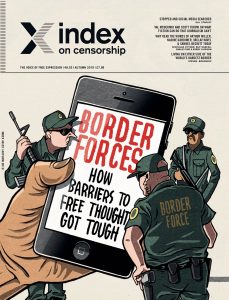
Border forces – how barriers to free thought got tough
[/vc_column_text][/vc_column][/vc_row][vc_row][vc_column][vc_custom_heading text=”Special Report: Border forces: how barriers to free thought got tough”][/vc_column][/vc_row][vc_row][vc_column][vc_column_text]Big brother at the border by Rachael Jolley
Switch off, we’re landing! by Kaya Genç Be prepared that if you visit Turkey online access is restricted
Culture can “challenge” disinformation by Irene Caselli Migrants trying to cross the Mediterranean to Europe are often seen as statistics, but artists are trying to tell stories to change that
Lines of duty by Laura Silvia Battaglia It’s tough for journalists to visit Yemen, our reporter talks about how she does it
Locking the gates by Jan Fox Writers, artists, academics and musicians are self-censoring as they worry about getting visas to go to the USA
Reaching for the off switch by Meera Selva Internet shutdowns are growing as nations seek to control public access to information
Hiding your true self by Mark Frary LGBT people face particular discrimination at some international borders
They shall not pass by Stephen Woodman Journalists and activists crossing between Mexico and the USA are being systematically targeted, sometimes sent back by officials using people trafficking laws
“UK border policy damages credibility” by Charlotte Bailey Festival directors say the UK border policy is forcing artists to stop visiting
Ten tips for a safe crossing by Ela Stapley Our digital security expert gives advice on how to keep your information secure at borders
Export laws by Ryan Gallagher China is selling on surveillance technology to the rest of the world
At the world’s toughest border by Steven Borowiec South Koreans face prison for keeping in touch with their North Korean family
Stripsearch by Martin Rowson Bees and herbaceous borders
Inside the silent zone by Silvia Nortes Journalists are being stopped from reporting the disputed north African Western Sahara region
The great news wall of China by Karoline Kan China is spinning its version of the Hong Kong protests to control the news
Kenya: who is watching you? by Wana Udobang Kenyan journalist Catherine Gicheru is worried her country knows everything about her
Top ten states closing their doors to ideas by Mark Frary We look at countries which seek to stop ideas circulating[/vc_column_text][/vc_column][/vc_row][vc_row disable_element=”yes”][vc_column][vc_custom_heading text=”Global View”][vc_column_text]Small victories do count by Jodie Ginsberg The kind of individual support Index gives people living under oppressive regimes is a vital step towards wider change[/vc_column_text][/vc_column][/vc_row][vc_row][vc_column][vc_custom_heading text=”In Focus”][vc_column_text]Germany’s surveillance fears by Cathrin Schaer Thirty years on from the fall of the Berlin wall and the disbanding of the Stasi, Germans worry about who is watching them
Freestyle portraits by Rachael Jolley Cartoonists Kanika Mishra from India, Pedro X Molina from Nicaragua and China’s Badiucao put threats to free expression into pictures
Tackling news stories that journalists aren’t writing by Alison Flood Crime writers Scott Turow, Val McDermid, Massimo Carlotto and Ahmet Altan talk about how the inspiration for their fiction comes from real life stories
Mosul’s new chapter by Omar Mohammed What do students think about the new books arriving at Mosul library, after Isis destroyed the previous building and collection?
The [REDACTED] crossword by Herbashe The first ever Index crossword based on a theme central to the magazine
Cries from the last century and lessons for today by Sally Gimson Nadine Gordimer, Václav Havel, Samuel Beckett and Arthur Miller all wrote for Index. We asked modern day writers Elif Shafak, Kerry Hudson and Emilie Pine plus theatre director Nicholas Hytner why the writing is still relevant
In memory of Andrew Graham-Yooll by Rachael Jolley Remembering the former Index editor who risked his life to report from Argentina during the worst years of the dictatorship[/vc_column_text][/vc_column][/vc_row][vc_row][vc_column][vc_custom_heading text=”Culture”][vc_column_text]Backed into a corner by love by Chen Xiwo A newly translated story by censored Chinese writer about the abusive relationship between a mother and daughter plus an interview with the author
On the road by Marguerite Duras The first English translation of an extract from the screenplay of the 1977 film Le Camion by one of the greatest French writers of the 20th century
Muting young voices by Brian Patten Two poems, one written exclusively for Index, about how the exam culture in schools can destroy creativity by the Liverpool Poet
Finding poetry in trauma by Dean Atta Male rape is still a taboo subject, but very little is off-limits for this award-winning writer from London who has written an exclusive poem for Index[/vc_column_text][/vc_column][/vc_row][vc_row][vc_column][vc_custom_heading text=”Column”][vc_column_text]Index around the world: Tales of the unexpected by Sally Gimson and Lewis Jennings Index has started a new media monitoring project and has been telling folk stories at this summer’s festivals[/vc_column_text][/vc_column][/vc_row][vc_row][vc_column][vc_custom_heading text=”Endnote”][vc_column_text]Endnote: Macho politics drive academic closures by Sally Gimson Academics who teach gender studies are losing their jobs and their funding as populist leaders attack “gender ideology”[/vc_column_text][/vc_column][/vc_row][vc_row][vc_column width=”1/3″][vc_custom_heading text=”Subscribe”][vc_column_text]In print, online, in your mailbox, on your iPad.
Subscription options from £18 or just £1.49 in the App Store for a digital issue.
Every subscriber helps support Index on Censorship’s projects around the world.
![]() SUBSCRIBE NOW[/vc_column_text][/vc_column][vc_column width=”1/3″][vc_custom_heading text=”Read”][vc_column_text]The playwright Arthur Miller wrote an essay for Index in 1978 entitled The Sin of Power. We reproduce it for the first time on our website and theatre director Nicholas Hytner responds to it in the magazine
SUBSCRIBE NOW[/vc_column_text][/vc_column][vc_column width=”1/3″][vc_custom_heading text=”Read”][vc_column_text]The playwright Arthur Miller wrote an essay for Index in 1978 entitled The Sin of Power. We reproduce it for the first time on our website and theatre director Nicholas Hytner responds to it in the magazine
READ HERE[/vc_column_text][/vc_column][vc_column width=”1/3″][vc_custom_heading text=”Listen”][vc_column_text]In the Index on Censorship autumn 2019 podcast, we focus on how travel restrictions at borders are limiting the flow of free thought and ideas. Lewis Jennings and Sally Gimson talk to trans woman and activist Peppermint; San Diego photojournalist Ariana Drehsler and Index’s South Korean correspondent Steven Borowiec
LISTEN HERE[/vc_column_text][/vc_column][/vc_row]
FEATURING
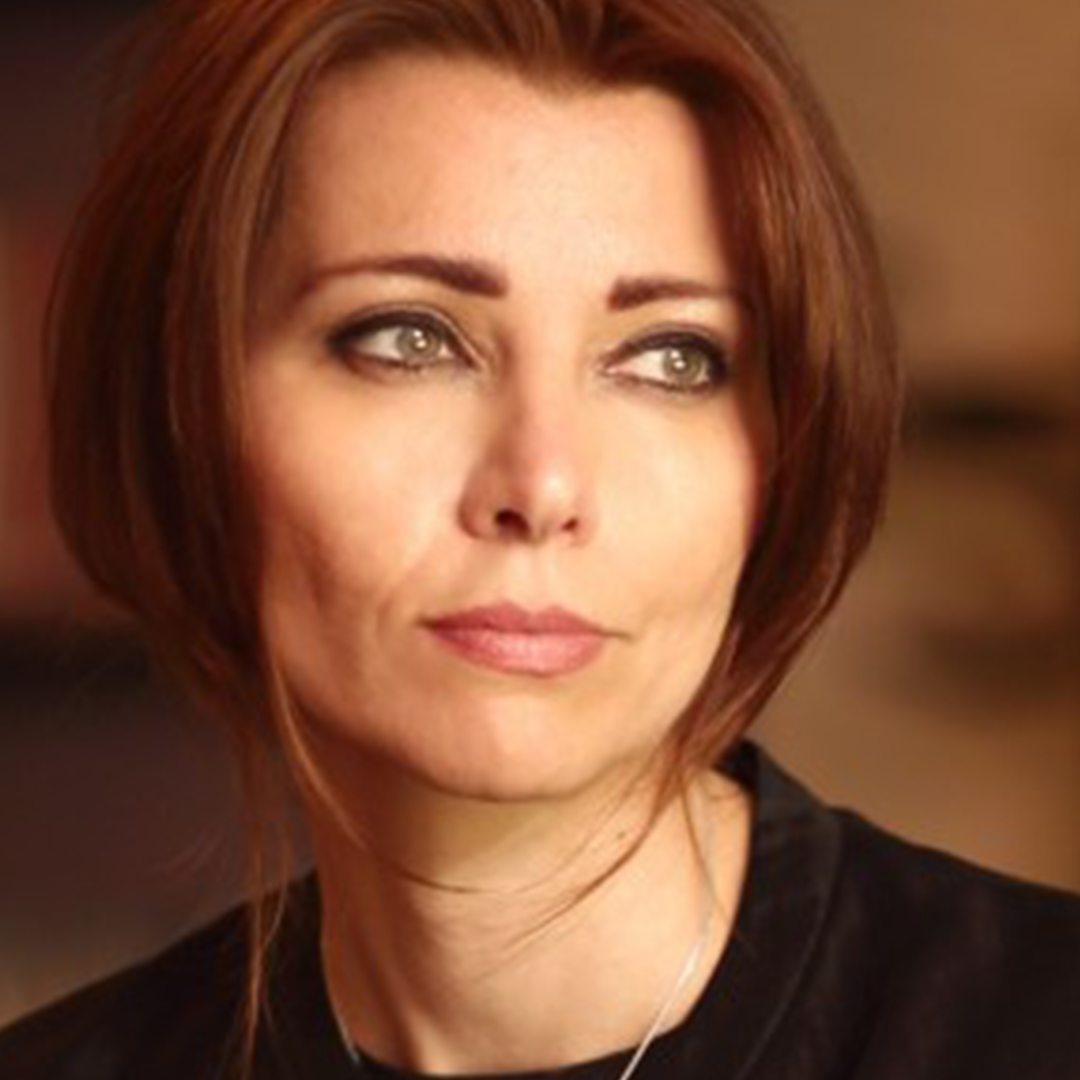
Novelist
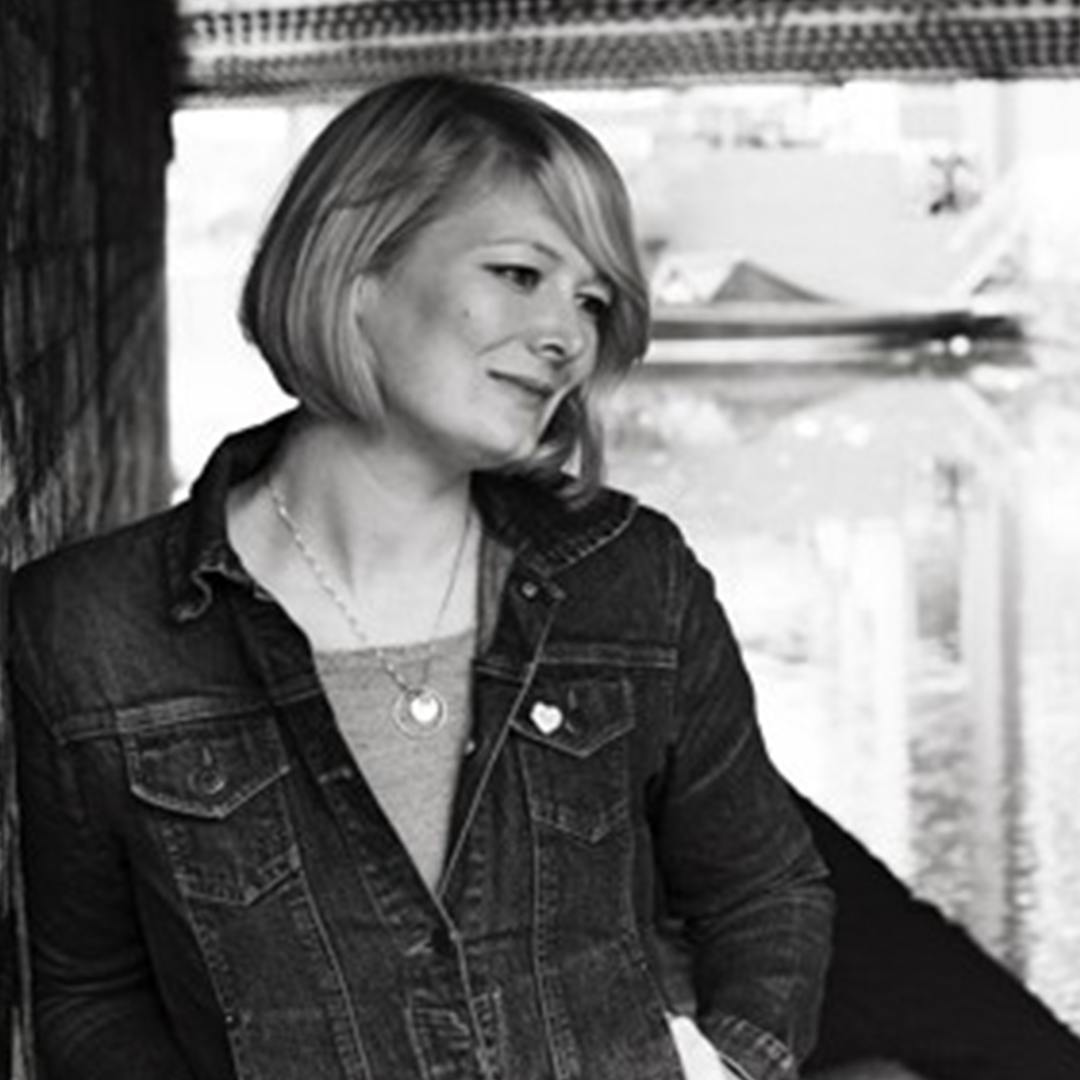
Novelist
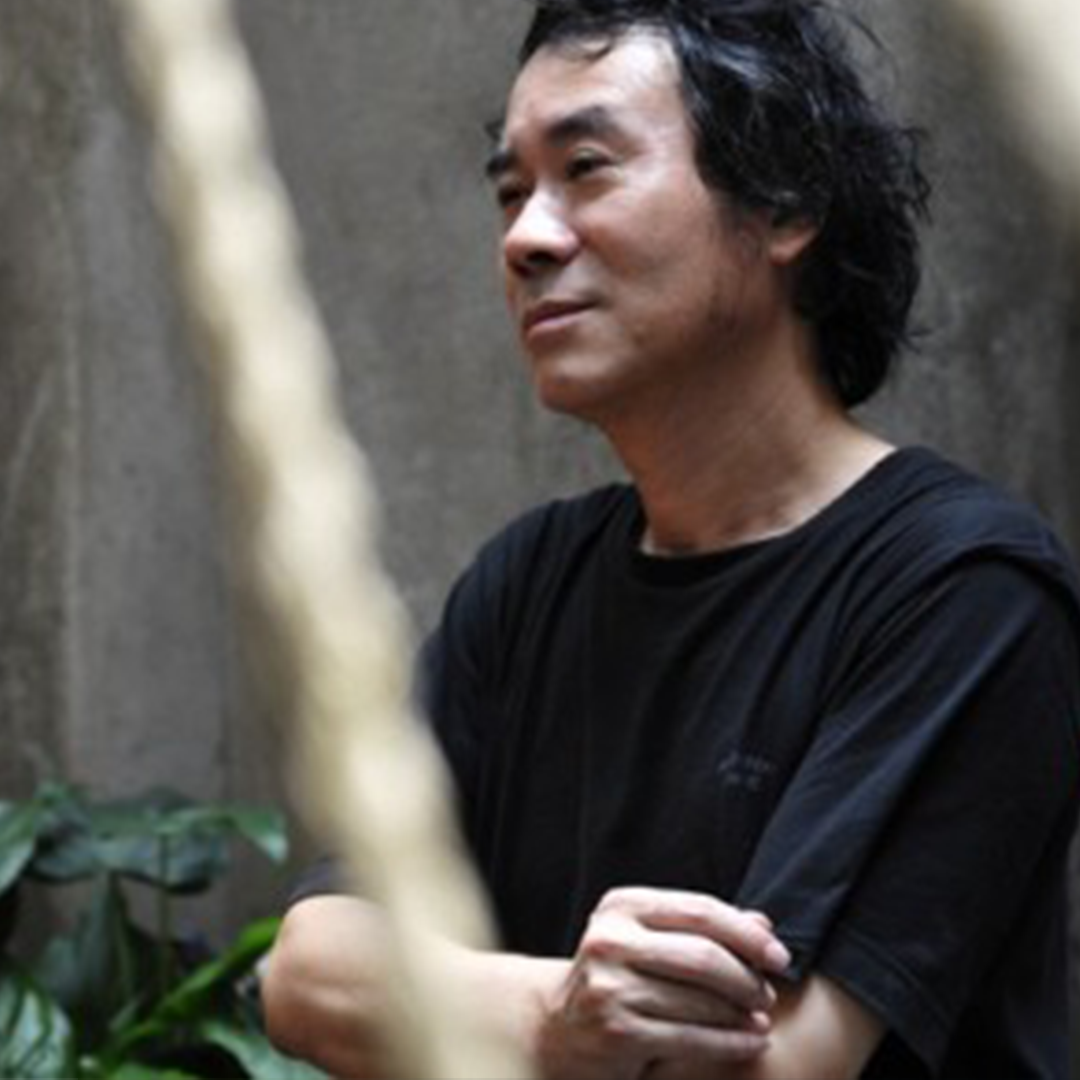
Writer
Re: To Human Rights Council Member and Observer States of the United Nations Human Rights Council, to raise the ongoing crisis for freedom of expression in Turkey
Excellencies,
Ahead of the 42nd regular session of the UN Human Rights Council (HRC), we, the undersigned human rights and journalists’ organisations, call on your delegation to speak out and address the Turkish government’s repressive campaign against freedom of expression. The Council must not continue to ignore such a blatant violation of Turkey’s international human rights law obligations and commitments.
The situation for freedom of expression in Turkey is now critical, as outlined in a joint submission on freedom of expression to the UPR of Turkey by civil society.(1) The right to hold and express dissenting opinions and to access information has been systematically undermined by the Turkish government in an intensive crackdown on journalists and independent media, academics, civil society, oppositional voices and the judiciary. Since 2016, the human rights situation in Turkey has steeply declined, facilitated by the misuse of sweeping emergency powers and the concentration of executive power. At the time of writing, at least 138 journalists and media workers are imprisoned, with hundreds more currently on trial facing lengthy sentences on manifestly unfounded terrorism charges. At least 170 media outlets have been closed down over claims they spread “terrorist propaganda”. Access to thousands of websites and platforms has been blocked after a government decree authorising removals and blockages of websites without judicial oversight.
This catalogue of human rights violations (see Appendix) is an affront not only to the Turkish Constitution and international obligations, but also flies in the face of the standards this Council has adopted, in particular on the Safety of Journalists (HRC Res 39/6) and on the Internet and Human Rights (HRC Res 38/7).
In a follow-up report to the HRC in June 2019, the Special Rapporteur on freedom of expression informed the Council that there had been a “lack of effective efforts by the State to implement the recommendations made” following his November 2016 country visit. In several areas, he found that the government was taking action “directly contrary” to the recommendations made.(2) Ahead of Turkey’s upcoming Universal Periodic Review,(3) the time to put the government on notice that it must change course, or face an intensification in international scrutiny is now.
All Member and Observer States committed to media freedom, democracy and the rule of law, must speak out during the Council’s 42nd Session.(4)
Yours Sincerely,
ARTICLE 19
P24: Platform for Independent Journalism
International Press Institute
IFEX
PEN International
German PEN
Swedish PEN
Danish PEN
English PEN
Norwegian PEN
International Federation of Journalists
European Federation of Journalists
Index on Censorship
European Centre for Press and Media Freedom
Cartoonists Rights Network International
Global Editors Network
Articolo 21
Vienna South East Europe Media Organisation
APPENDIX
Background
In July 2016, a state of emergency was imposed in Turkey after a failed coup attempt, which was followed by mass arrests and mass dismissals of judges, prosecutors and civil servants perceived to be in opposition to the government. Many of those arrested are reported to have been subject to torture and ill-treatment in detention and have faced politicised trials falling well below fair trial standards. Since then, President Erdoğan’s government has sought to tighten its grip, shutting down media outlets and imprisoning journalists on an alarming scale. Although the state of emergency was formally lifted in July 2018, legal amendments have effectively entrenched the broad powers enabled during the state of emergency into the legal framework, reducing legislative and judicial oversight of the executive, to enable an increasingly authoritarian regime. Constitutional amendments following the 2017 referendum further increased the powers of the President, while other reforms have directly limited the independence of the judicial appointments body, the Council of Judges and Prosecutors, from the executive.
Challenges to the Erdoğan regime brought by Turkey’s 2019 local elections, with opposition parties winning mayoral seats in crucial cities such as Istanbul, Ankara and Izmir, brought hope of reform, but the regime’s repression of dissent has continued, most recently with new efforts to severely restrict access to online content on the country and the continued arrest and mistreatment of journalists.(5)
Crackdown on journalists and media
The arbitrary detention of hundreds of journalists, academics and human rights defenders is a matter of grave concern: in the last three years, Turkey has been the world’s most prolific jailor of journalists. In 2018 alone, 59 journalists were sentenced to a collective total of 419 years and 8 months in prison for “being a member of a terrorist organisation”, “managing a terrorist organisation” or “aiding a terrorist organisation”.(6) Trumped up terrorism charges are routinely used against journalists expressing critical or dissenting opinions, and result in lengthy prison terms. In February 2018, UN Special Rapporteur on the right to freedom of expression, David Kaye, and Representative on Media Freedom for the Organization for Security and Co-operation in Europe, Harlem Désir, expressed deep concern in relation to an “unprecedented assault on free speech” with regards to the life sentences imposed on journalists Ahmet Altan, Mehmet Altan, Nazlı Ilıcak and others. Defendants in this case were convicted for “attempting to overthrow the constitutional order” initially on the basis of “subliminal messages” allegedly sent on a TV channel the night before the 2016 attempted coup.(7)
Independent media has been all but wiped out. Under State of Emergency Decrees at least 170 media outlets including publishing houses, newspapers and magazines, news agencies, TV stations and radios were closed. Only 21 of these have been able to reopen, some of them only on the basis that they agree to major changes in their management boards.(8) Many independent outlets have been permanently silenced, through the liquidation and expropriation of all their assets.(9)
The recent acquittal of Erol Önderoğlu, Şebnem Korur Fincancı and Ahmet Nesin in the Özgür Gündem editors for a day case,(10) and the May 2019 Constitutional Court decision recognising the violation of the right to freedom of expression in individual applications of the Academics for Peace cases, have been positive.(11) However, these developments have been counterbalanced by the attacks against civil society in the ongoing trial against 16 leading civil society figures involved the Gezi Park case, which sees the continuation of two years’ pre-trial detention of Osman Kavala.
Rule of law
These arrests and trials are taking place in the context of the absolute collapse of the rule of law in the country, where there is no prospect of a fair trial for defendants. Turkey’s judicial independence has been severely damaged by increasing governmental pressure on the judiciary, with judges in fear of reprisals if they fail to rule in favour of the government in politically motivated trials.
Indictments have lacked credible evidence to justify prosecution, often containing factual inaccuracies and absurd claims. Prosecutors routinely fail to disclose evidence to defendants or their legal counsel, and evidence obtained through torture has been deemed admissible. The vast majority of cases have relied exclusively on individuals’ legitimate journalistic work, or human rights work, as evidence of membership or promotion of a terrorist organisation, or involvement in the coup attempt.
FOOTNOTES
1 Turkey will be considered at the 35th Session of the Working Group in January 2020, and therefore the 42nd Regular Session of the HRC is an important opportunity to demonstrate concern to Turkey over the situation for freedom of expression in the country. See: Joint submission to the Universal Periodic Review of Turkey by ARTICLE 19, P24, PEN International, English PEN, Reporters Sans Frontiers (RSF), International Press Institute (IPI), Freemuse, European Centre for Press and Media Freedom (ECPMF), IFEX and Norsk PEN, July 2019; Available at: https://www.article19.org/wp-content/uploads/2019/07/Turkey-UPR-submission_July2019.pdf
2 See, for example: ‘Follow-up on country visits – Report of the Special Rapporteur on the promotion and protection of the right to freedom of opinion and expression’, A/HRC/41/35/Add.2; Available at: http://ap.ohchr.org/documents/dpage_e.aspx?si=A/HRC/41/35/Add.2
3 Ibid., n.1.
4 In addition to General Debates under Items 2 and 4, States may also speak out during the Interactive Dialogue with the Working Group on Arbitrary Detention (Item 3).
5 ‘Turkey: New regulation and website blocks mark further assault on online freedoms’, ARTICLE 19, 08 August 2019; Available at: https://www.article19.org/resources/turkey-new-regulation-and-website-blocks-mark-further-assault-on- online-freedoms/ and ‘Turkey: Stop excessive use of force in peaceful protests’, ARTCILE 19, 20 August 2019; Available at: https://www.article19.org/resources/turkey-stop-excessive-use-of-force-in-peaceful-protests/
6 Media Monitoring Report 2018: One Year of the Journalist and the Media’, Bianet, 20 February 2019; Available at: http://bit.ly/2ZackBl.
7 ‘Turkey: Life sentences for journalists are “unprecedented assault on free speech”, say UN and OSCE experts’, OHCHR, 16 February 2018; Available at: https://www.ohchr.org/EN/NewsEvents/Pages/DisplayNews.aspx?NewsID=22670&LangID=E
8 A detailed list of closed media outlets. See: ‘Journalists in Prison (Google Doc); Available at: http://bit.ly/2Zdn1CW.
9 In its March 2017 opinion, the Venice Commission questioned the lawfulness and necessity for these permanent liquidations, finding them to be incompatible with Article 10 of the European Convention on Human Rights. See: ‘Draft Opinion on the Measures Provided in the Recent Emergency Decree Laws with Respect to Freedom of the Media’ Venice Commission, 24 February 2017; Available at: http://bit.ly/2LEPfnd.
10 ‘OSCE Media Freedom Representative welcomes acquittal of Turkish journalists Erol Önderoğlu, Ahmet Nesin and human rights defender Şebnem Korur Fincancı’ 17 July 2019; Available at: https://www.osce.org/representative-on- freedom-of-media/425855
11 Constitutional Court: Freedom of Expression of Academics for Peace Violated, 26 July 2019. Available at: http://bianet.org/english/law/210934-constitutional-court-freedom-of-expression-of-academics-for-peace-violated
[vc_row][vc_column][vc_column_text]
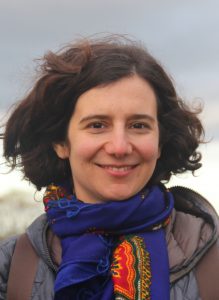
Noémi Lévy-Aksu
On 26 July 2019, Turkey’s highest court brought new hope to Turkish academics when it ruled that ten educators who had signed the petition “We will not be a Party to This Crime!” (Bu Suça Ortak Olmayacağız) had been tried unfairly and in violation of their rights.
The petition, created by the Kurdish rights group Academics for Peace, called on the Turkish government to “prepare the conditions for negotiations and create a road map that would lead to a lasting peace which includes the demands of the Kurdish political movement”. It was signed by over two thousand academics, all of whom were then individually charged with “conducting propaganda for a terrorist organisation”. The news that the resulting trials might violate the signatories rights sparked a firestorm of controversy in Turkey, where academia is tightly controlled and public discussion of the trials has been constrained.
Noémi Lévy-Aksu is an historian of the late Ottoman Empire and modern Turkey and an aspiring lawyer. She has French and Turkish citizenship and was working as an assistant professor at Boğaziçi University until 2017, when she was dismissed for signing the Academics for Peace petition, an experience about which she previously spoke to Index in 2018. Lévy-Aksu is currently a teaching fellow at the London School of Economics and she is involved in human rights advocacy and volunteer legal work. She still speaks out about her experience and she spoke with Index’s Sophia Paley about the latest developments in the challenges facing Turkish academics and their students.
Index: Thousands of academics have been dismissed for political reasons since the coup in 2016, most of them were not signatories of the Academics for Peace petition. Why do you think the Academics for Peace cases have gotten so much more international attention than these other cases?
Noémi Lévy-Aksu: The case of the Academics for Peace has become emblematic of the attacks on academic freedom and freedom of expression in today’s Turkey. The sole ground on which academics have been threatened, dismissed and prosecuted is their endorsement of a declaration demanding the end of state violence against civilians and the resumption of the peace process. In this respect, it is one of the multiple cases of criminalisation of critical thought and expression, which target journalists, political actors, human rights defenders as well. The degree of international attention is also due to the efforts of the Academics for Peace themselves, who have established solidarity networks in Turkey and abroad to support the signatories and raise awareness about their cases among academics, human rights defenders and policy-makers.
Index: What do you think will happen to the petition signatories who have already been sentenced, including those who legally forfeited their right to an appeal?
Lévy-Aksu: Turkey’s constitutional court has ruled that the conviction of the signatories of the Academics for Peace declaration was a violation of their rights and considered that the declaration was within the scope of academic freedom. The court also ordered that a copy of the decision be sent to the lower courts involved in the process. Accordingly, those still under prosecution should be acquitted, re-trials should be held for the ones who have received a final sentence and the regional courts of appeal should reverse the conviction for the cases that are pending on appeal.
Index: Do you think that the high court’s verdict represents a genuine turning point for academic freedom in Turkey, or is that a false hope? What is the verdict’s significance?
Lévy-Aksu: The decision of the constitutional court is an important landmark, following a few other positive decisions acknowledging the wide scope of freedom of expression in international law and Turkish legislation. In this respect, it brings hope not only to academics, but also to all those who are currently prosecuted for their opinions and statements in Turkey, as well as to the national and national human rights defenders. However, the decision was adopted with a one-vote majority and triggered harsh criticism in the pro-governmental media. Legally, the decisions of the constitutional court are binding on inferior courts, but in the last few years some inferior court judges have proved reluctant to apply those decisions, so the next few months will be crucial to evaluate the legal impact of this judgment.
Finally, one should not forget that the criminal prosecution of the Academics for Peace is just one aspect of the multiple attacks against academic freedom in today’s Turkey. Arbitrary dismissals and obstacles to critical research remain burning issues, which cannot be solved without a strong political will.
Index: According to pro-state media, 1,071 academics have signed a manifesto condemning the high court’s verdict. Why do you think they would do such a thing? Do they truly believe their fellow academics are promoting terrorism? What is their motivation?
Lévy-Aksu: The “1071” declaration was initiated by a few university rectors, who did not hesitate to stand against the highest court of the country to show their loyalty to the political power. The number “1071” was chosen as a reference the Malazgirt battle in 1071, but it soon appeared that the list was not accurate: some signatories appeared twice, while a few declared that their names had been included without their consent. One lecturer from Istanbul Aydın University even resigned to protest against her name being used without her consent. As for the more than a thousand academics who chose to endorse such a declaration, some are active supporters to the government, while others probably feared sanctions if they answered negatively to their rectors’ requests. In any case, this declaration gives an idea of the atmosphere in these universities, where administrations are completely beholden to political power and the academic staff have little choice but active or passive consent.
Index: How familiar is the Turkish public with the government’s tightening restrictions on academic freedom? What do you believe is their reaction?
Lévy-Aksu: Turkey’s public sphere is so divided that it is impossible to talk about the “Turkish public”. The case of the Academics for Peace petition has received attention both in pro-governmental and in independent media, from very different perspectives. In the pro-governmental discourse, purges in academia are presented as part of the fight against terror and its supporters, either Gulenists or pro-Kurdish. In that view, state security and the interests of the nation are involved, so academic freedom is not important. On the other hand, restrictions on academic freedom are increasingly criticised in the public sphere, as part of the broader violations of human rights and freedoms in Turkey, but also because of their negative impact on the quality of teaching and research in the Turkish academia.
Index: Speaking of the quality of Turkish higher education, how do solidarity academies differ from other private educational institutions, and what is their role in providing space for open inquiry and critical thought?
Lévy-Aksu: Solidarity academies are alternative structures created by academics who believe that new spaces are needed to resist attacks against academic freedom and critical thought. Many of them, though not all, are signatories to the Academics for Peace petition who were dismissed from their academic positions. Solidarity academies started as local, informal initiatives in various cities of Turkey, such as Eskişehir, Kocaeli, Dersim, Mersin, Izmir, Ankara and Istanbul. Several have now become more organised and obtained a legal status as associations. Contrary to private educational institutions, they are non-profit organisations and they aim to develop innovative approaches to research and teaching, with special emphasis on freedom and critical thinking. While they do not seek to reproduce the conventional academic system, these academies have connections with international research networks and scholars and they make an important contribution to knowledge production in Turkey. As an increasing number of countries witness attacks on academic freedom, such initiatives are vital to develop transnational networks of solidarity and support academics and students affected by these developments.
Index: The Turkish government is increasingly relying on anti-terrorism legislation to attack its political enemies. Why was this specific justification chosen, and how does it change the legal process?
Lévy-Aksu: Using anti-terror legislation to attack political enemies is a strategy that has been used by the Turkish successive governments for decades. As in other countries, anti-terrorism legislation enables the state to limit the rights of the suspects, as illustrated by the anti-terror law adopted after the state of emergency was lifted in July 2018. Inter alia, it allows longer custody periods and defenders and lawyers can be prevented from accessing the case file. Beyond these legal aspects, labelling critical voices as terrorist is a political strategy that aims to shape public opinion and increase support of the government. It presents the prosecution and imprisonment of opponents as legitimate and necessary for the interests of the nation.
Index: The Turkish Constitution includes provisions forbidding “[u]niversities, members of the teaching staff and their assistants” from engaging “in activities directed against the existence and independence of the State, and against the integrity and indivisibility of the Nation and the Country”. This unity of the nation includes linguistic and cultural unity, as shown in the mandate that “No language other than Turkish shall be taught as a mother tongue to Turkish citizens at any institutions of training or education”. Do these guarantees of a unitary ethnostate for Turks influence how the Academics for Peace petition signatories and others were treated?
Lévy-Aksu: This question raises several important issues which it is impossible to fully answer here. The first issue is related to the tension between academic freedom and national security. This is not specific to Turkey (see for instance the much debated Prevent legislation in the UK), but since the beginning of the republic, regardless of the political orientation of the government (and with a few exceptions), the state’s approach to academic freedom has been particularly restrictive in Turkey.
The second issue has to do with Turkish nationalism and its negative perception of cultural and linguistic diversity, which has constituted an important aspect of the Kurdish issue in the last decades. Education in their mother tongue is a recurrent demand of the Kurdish rights movement. While the government seemed willing to develop a more conciliatory approach to the question during the peace negotiations, since the process collapsed, a rigid version of Turkish nationalism has been on the rise again. As an urgent call to stop state violence against civilians, the declaration of the Academics for Peace was not directly related to the question of cultural rights, but it emphasised the need for a peaceful resolution to a conflict that has lasted for decades. The attacks against the signatories illustrate how, under the current government, human rights and democratic values are treated as subversive when they are used to articulate a critique of the state. Meanwhile, countless citizens have been imprisoned or prosecuted for their political and cultural activities on behalf of Kurdish rights and democracy.
Index: Some observers emphasise the worsening situation for academics after the failed coup of 2016. Do you agree that 2016 was the turning point, or if not, when did these problems begin?
Lévy-Aksu: Attacks on academic freedom did not start with the failed coup of 2016, nor actually with the AKP government. With respect to the Academics for Peace signatories, the repression started right after the petition was released in January 2016. The signatories were immediately the targets of hate speech, the first dismissals occurred, and four signatories were imprisoned. However, after a state of emergency was proclaimed in July 2016, the process dramatically accelerated and the purges targeting Gulenists, the Academics for Peace signatories and other opponents became massive in higher education, as in other sectors. The civil servants dismissed by the emergency decrees did not only lose their jobs: their passports were revoked, and they received a life-long ban on public service. In addition, they continue to face informal practices of black listing and discrimination. This process has been described as “civil death” by some signatories and continue to have dramatic moral and material consequences.
Index: Are you worried or hopeful for the future of Turkey’s education system, and why?
Lévy-Aksu: The current situation of Turkey’s education system is extremely worrying. Successive reforms implemented in primary and secondary education have further disorganised the system, and all levels of education have experienced purges. Higher education has been decimated by these purges. Even though not all critical academics have been dismissed, the space for academic freedom has dramatically shrunk in all universities and many choose self-censorship to avoid possible sanctions. Both the Turkish Higher Education Council and the Scientific and Technological Research Council (TUBITAK) have been discredited by their prominent role in the dismissal and marginalisation of critical scholars. The students are the main victims of this process, both because they have lost many dedicated and inspiring teachers, but also because they are themselves targeted by repression, both at the disciplinary and criminal levels. There are tens of thousands students imprisoned today in Turkey.
Yet, the resilience of civil society in Turkey is remarkable, and international solidarity has enabled a number of critical scholars to continue their research away from Turkish academia. It is my hope that the experience academics have gained of alternative structures such as the solidarity academies and the international networks developed during these years will contribute to transforming the education system for the better when there is a political opening. [/vc_column_text][vc_basic_grid post_type=”post” max_items=”4″ element_width=”6″ grid_id=”vc_gid:1566481960332-5be62801-2970-10″ taxonomies=”8843″][/vc_column][/vc_row]